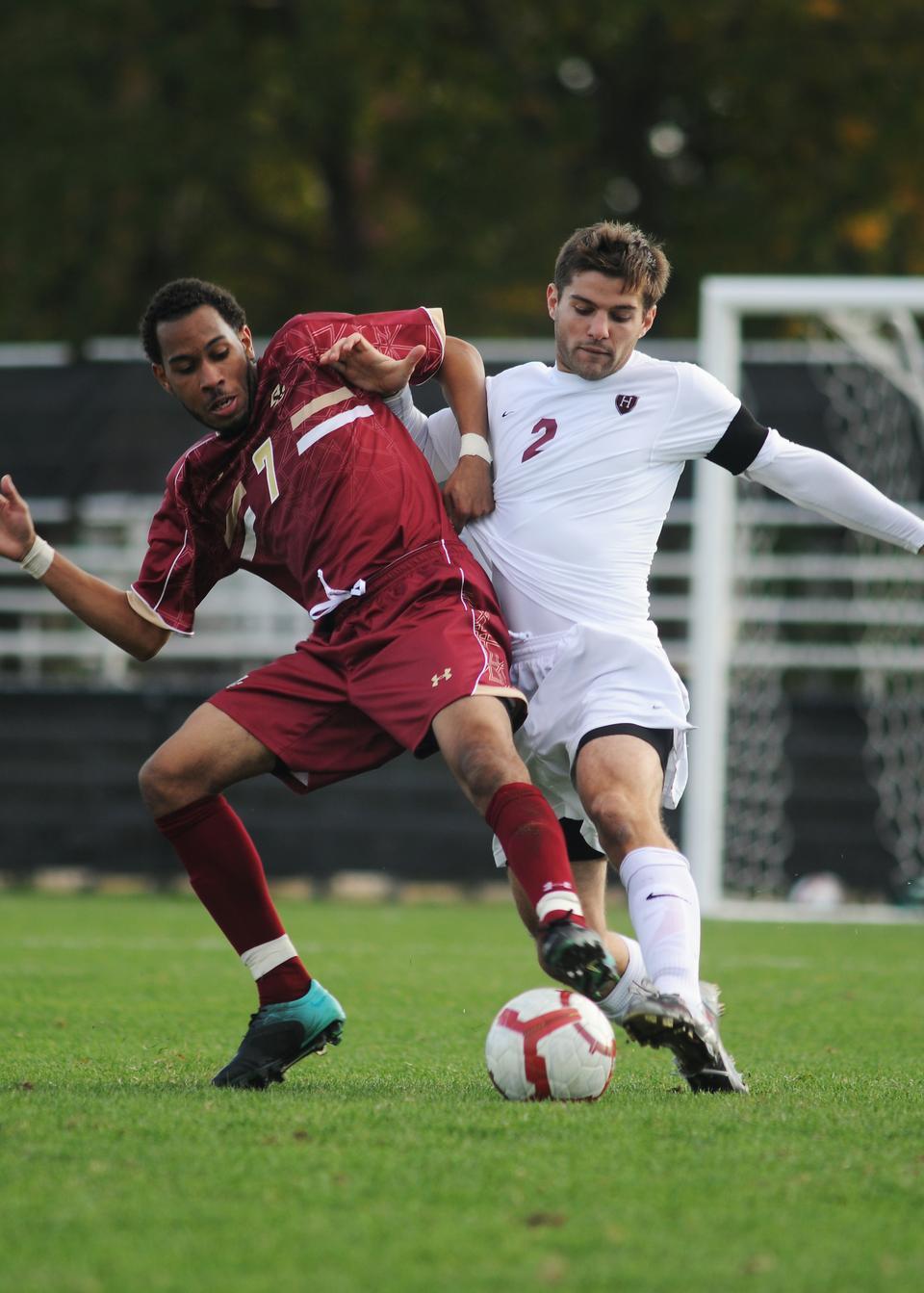
News
Summers Will Not Finish Semester of Teaching as Harvard Investigates Epstein Ties

News
Harvard College Students Report Favoring Divestment from Israel in HUA Survey

News
‘He Should Resign’: Harvard Undergrads Take Hard Line Against Summers Over Epstein Scandal

News
Harvard To Launch New Investigation Into Epstein’s Ties to Summers, Other University Affiliates

News
Harvard Students To Vote on Divestment From Israel in Inaugural HUA Election Survey
MEN'S SOCCER: Crimson Falters Late in Year

Harvard began its fall season with a win over then-No. 13 Stanford and ended its schedule with a victory over then-No. 18 Penn. In between, the Crimson struggled to convert its close matches into wins, finishing 5-7-5 overall and 2-3-2 in the Ivy League to tie for fifth in the Ancient Eight. But these bookend wins speak better to the spirit of the season, in which Harvard grew as a squad and competed with some of the best teams in the nation.
“The season had its ups and downs,” co-captain Jaren LaGreca said. “We had one of the most difficult schedules we’ve ever had. As a team, we may not have had the best results, but we grew a lot, had a very unified team, and really showed perseverance through adversity. Overall, I would say we had a successful season.”
In his first season as head coach, Carl Junot led the Crimson through a tough schedule, including nine teams that would go on to participate in the NCAA Division I tournament.
Harvard initially showed promise, winning its season opener against the Cardinal in Soldiers Field Soccer Stadium in front of over 3,000 fans.
“[That match] was one of the best memories I’ve had playing Harvard soccer,” LaGreca said. “It was incredible to play in front of that crowd, because it makes it that much more special.”
“You can coach until you are blue in the face, but nothing lifts the level of play like a great environment and playing in front of crowds like that,” Junot said.
The Crimson carried its momentum to defeat Massachusetts in the second game of its season. But from there, Harvard struggled to capitalize, winning only three other matches throughout the remainder of its schedule.
Despite this, the Crimson remained competitive, with only one match of the season being determined by a goal differential larger than one.
“Overall, I think we would have liked to see more wins as opposed to ties and losses,” Junot said. “But we were happy with the competitive nature of our team...both on the wins and losses side.”
The low-scoring matches were a product of Harvard’s strong defensive unit, led by co-captain Robert Millock, and solid goalkeeping by junior Austin Harms and sophomore Brett Conrad. Millock and Harms were given All-Ivy second team and honorable mention nods, respectively.
“[Millock] is a great leader on and off the field and was a big part of our success,” Junot said. “I think we have two of the best goalkeepers in the Ivy League. Our defense is as solid as can be.”
Sophomores Scott Prozeller and Brian Rogers also had strong presences in the midfield and offensive third, respectively, with both players being named to the All-Ivy League second team.
Ultimately, the squad’s successes were a product of a team effort.
“We were more of a team and more unified this season than we had ever been before,” LaGreca said.
In its final match of the season, Harvard defeated the Quakers, 2-1, on a golden goal in double overtime, allowing the Crimson to come full circle.
“Penn had beaten us in previous years to take the Ivy title away from us,” LaGreca said. “So it was not only a redemption game from past years, but also a way to prove to ourselves…that we still were a very good team. It was a great way for the senior class to wind up their careers.”
Harvard has built off the progress from the fall season to challenge itself against international opponents, losing to the Haitian national team in penalty kicks in front of over 11,000 fans. The match was an exhibition fundraiser at Harvard Stadium to benefit Partners in Health.
The Crimson will also travel to South Korea this summer to compete.
“Ultimately, I think we’ve made progress,” Junot said. “We want to give our players an environment where they can mature. This year, we’ve really been working on shaping the team identity and figuring out what type of team we want to be.”
—Staff writer Stephanie E. Herwatt can be reached at sherwatt@college.harvard.edu.
Want to keep up with breaking news? Subscribe to our email newsletter.
